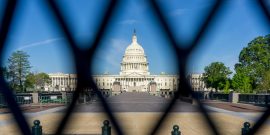Hungary PM Viktor Orbán meets with President Trump in the White House today. We discuss the issues raised by Orbán's controversial tenure.
A Foucauldian Defense of Liberalism
There is a strong case to be made that Michel Foucault was the most important and influential thinker of the second half of the twentieth century. He was not a nice man. And many of his conclusions were odious. But he discerned the path on which modernity was walking better than almost anybody else.
The most useful of Foucault’s contributions were not published in book form but were delivered as lectures, posthumously compiled and translated. Those gathered in the collection Security, Territory, Population are far and away the most significant. In them, Foucault provides a complete conceptualisation of the evolution of modern governance, showing how it is characterised, above all, by “governmentality” or what has elsewhere been called the “conducting of conduct.”
As soon as one hears the latter phrase, one instantly understands the insight. To live in a modern society is to have one’s conduct constantly monitored, manipulated, altered, nudged, shaped, questioned, problematised, and corrected. And those who govern us seem to have taken on the role of the conductors of an orchestra, watching over our movements and guiding us in concert. Our life choices are not our own, despite being continually reassured otherwise; instead, we merely follow the motions of the baton. Foucault saw this state of affairs as one which had been evolving gradually since the 1500s and which was by 1977, the year in which he was speaking, already far advanced. In 2023 we see its vast acceleration: while we are nominally free citizens of liberal democracies, we all understand what is in fact expected of us by our governors—to consume less carbon, to drive less, to exercise more, to eat less meat, to own fewer assets, to consume less alcohol and tobacco, to celebrate diversity, to favour open borders, to be fully vaccinated, to avoid single-use plastic, and so on and so forth. Everyone knows the litany.
Foucault’s insight was that this phenomenon would not primarily find effect through the issuing of laws, edicts, or decrees. There are of course “hard” legal requirements for us to follow (one thinks, for example, of bans on new petrol cars, which are in the offing almost universally across the developed world). But most of the conducting of our conduct happens through much more diffuse means—a kind of soft coercion which works not by imposing demands but by suffocating alternatives. It’s not illegal to eat meat. We just get cajoled into “healthier” options. You won’t be thrown in prison for spreading vaccine “disinformation.” You’ll just find your social media accounts suspended or your comments censored. It’s not that it will ever be unlawful to get on a plane to Greece for holiday. It’s just that fuel surcharges will eventually make this prohibitively expensive for the hoi polloi. Driving a petrol car will never be made a criminal offence, but local authorities will, through congestion charges, traffic management, and bus lanes, make it so miserable to be a motorist that people will eventually simply stop driving. Strikingly, most of these measures are not implemented by the state alone, but by its acting in concert with nominally private entities—many of them operating in the digital sphere.
This is not to suggest a conspiracy is afoot. Part of what makes governmentality so effective is precisely that it comes about through the individual decisions of many different actors, all of whom have ostensibly good reasons for doing what they are doing. Every time our conduct is conducted, the conductor has a reasonable argument for doing so—it is good for us, good for each other, good for the planet, good for the future. There’s no sinister Bond villain twirling his moustache or stroking his cat. There are merely thousands of policies being enacted every day, in the world of politics and commerce, which in their proliferation take on a crushing weight and force.
How do we escape from the conducting of conduct, in order to live lives that are truly meaningful and free? Foucault’s framework for thinking about such matters was notoriously pessimistic.
What, then, is wrong with this? If our conduct is being conducted for our own good, or in the public interest, then isn’t our free agency worth sacrificing? Foucault’s answer to this was that, while “nothing is bad … everything is dangerous.” The problem with governmentality is not that any particular end selected by those who govern is in itself undesirable. The problem is that ceding the authority to make such determinations to a governing class is in itself fraught with risk—because ultimately they will act in their own class interests, which may not align with the interests of everybody else. Think for example of the views that the governing classes in most developed countries hold concerning migration, which suits their own interests very nicely (masses of cheap imported labour) but does not necessarily accord with what is best for the people of Redcar, Charleroi, or Flint.
Perhaps more importantly, even if we set to one side the substance of what we are being encouraged to do, it remains the case that human agency is good in itself. And the ability to make choices deriving from one’s own understanding of ethics was for Foucault the central element of such agency. If one does the “right thing” (gets an electric car; becomes a vegan; supports the approved causes) merely because one has no other options, then one is not really behaving ethically at all. Genuine ethics can only be exercised where there is genuine choice. To deprive the population of choice by closing off undesirable options is therefore to deprive it of the most basic element of human freedom.
How then do we escape from the conducting of conduct, in order to live lives that are truly meaningful and free? Foucault’s framework for thinking about such matters was notoriously pessimistic. The impression he gave was clear: there is ultimately no way to avoid being, in some sense, governed, and indeed it was probably desirable that this should be so. But he did suggest a method, in the form of his concept of “counter-conduct,” to consciously refuse to play ball or, put more positively, to try to find ways to be “governed less.”
Counter-conduct is sometimes interpreted to mean petty rebellion. And it is not difficult to see why some might bristle so strongly against, say, being constantly harangued to reduce their carbon footprints that they begin to go out of their way to make them bigger. But that would probably in itself be unethical, and in any case, can never really work: all that kind of behaviour does is encourage a backlash in the form of yet more social control. No, counter-conduct cannot simply mean bloody-mindedness—there has to be more to it than that.
Liberalism in this conception is the only way of organising the relationship between state and society in such a way that it is possible for different groups of people to choose different allegiances, and to subject themselves to different modes of the “conducting of conduct,” than merely that of the state.
Instead—ironically, given Foucault’s own personal predilections—it is better to think of counter-conduct as inhering in efforts to step outside of the dominant framework in which the conducting of conduct takes place; to find, as it were, alternative arenas of life in which different governing styles operate. These—the family, the church, synagogue or mosque, and the local community—are places where one does not merely rebel against the mainstream, or, for that matter, embrace abstract freedom from any and all social ties whatsoever. They are places where one discovers a web of relationships of authority, obedience, and mutual support deriving their strength from love, friendship, and trust rather than (as is the case with the state) from power alone. One counters the conducting of conduct by the state and its apparatus, in other words, not by kicking back mulishly against one’s governors, but by searching for opportunities to place one’s loyalty in alternative sources of meaning. One does not thereby escape the application of governmentality, the conducting of conduct, entirely. But one at least acts out of some volition—some level of choice. (And, of course, the more local and proximate the locus of authority, as in, say, the family or church, the more space one has to exert some level of influence of one’s own.)
This makes the implications of Foucault’s thought thoroughly liberal in the classical sense, if we take liberalism to mean—as John Gray often reminds us—a political system that, however imperfectly and incompletely, preserves the right of citizens to freely associate based on matters of conscience. (And, indeed, Foucault himself seemed to take an increasingly positive view of liberalism as he aged—something for which the academic left has never quite forgiven him.) Liberalism in this conception is the only way of organising the relationship between state and society in such a way that it is possible for different groups of people to choose different allegiances, and to subject themselves to different modes of the “conducting of conduct,” than merely that of the state. It is by no means the case that a liberal political framework can—or indeed should—free citizens from all restraint. But it is the only political framework that holds out any hope for being governed less.
Counter-conduct is not, then, simply refusing to do what one is told. It should be understood rather as a positive act—a means by which the human subject participates in alternative frameworks in which our conduct is conducted. Foucault himself was given to insisting, somewhat gnomically, that freedom was a “practice.” To mean anything, it had to be exercised and exercised consciously. It was no good being nominally “free” if one simply followed the conductor. This should serve as a call to arms to anybody who chafes against the totalising narratives of our age. Rebellion for rebellion’s sake is not the answer, but neither is passive acceptance. What is required is a willed commitment to other ways of living—the family, religious institutions, community organisations—freely chosen. And perhaps, also, a rediscovery that the essence of liberalism is in its insistence that such competing sources of loyalty should remain intact.



